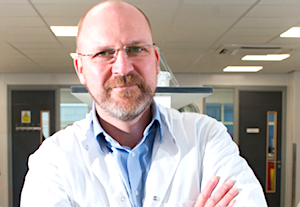Shares of Wetherby-based biotherapeutics company Avacta Group plc rose 12% on Thursday after the company published an update on its collaboration with the University of Glasgow working on a potential therapy for COVID-19 infection.
“Avacta Group plc … is pleased to announce that collaborative work with the Centre for Virus Research at the University of Glasgow has shown that Affimer reagents which bind to the SARS-COV-2 virus spike protein prevent infection of human cells by a SARS-COV-2 model virus and therefore provide a potential therapy for COVID-19 infection,” said Avacta in a stock exchange statement.
“Recently, Avacta reported that several of the Affimer reagents that had been generated to develop COVID-19 antigen tests inhibited the interaction between the coronavirus’ spike protein and a receptor found on human cells, called ACE2, which the virus spike protein binds to as the first step in infecting cells.”
Avacta said it has now successfully completed the initial phase of a collaboration with Professor David Bhella at the University of Glasgow showing that these “neutralising” Affimer reagents prevent a SARS-COV-2 model virus from entering human cells and therefore provide a potential therapy for COVID-19.
Avacta added: “Affimer reagents have key benefits compared with antibodies as virus neutralising therapies: Their small size and high solubility means that a much higher concentration of Affimer molecules can be used in the drug formulation to more effectively block the spike proteins on each virus particle and better protect the patient; bispecific and trispecific Affimer neutralising therapies that bind to more than one part of the spike protein could ensure the effectiveness of the neutralising therapy even if the virus’ spike protein mutates.
“Work is continuing with Professor Bhella to further study the way in which the Affimer reagents prevent infection and Avacta is using this growing body of data actively to secure a large pharmaceutical partner to develop these potential therapeutic candidates rapidly.”
Avacta Group CEO Dr Alastair Smith said: “I am delighted that our collaborators at the University of Glasgow have confirmed that these Affimer reagents not only block the spike-ACE2 binding but efficiently prevent a SARS-COV-2 model virus from entering human cells.
“This is critical information that will help to establish a license deal with a large pharmaceutical partner that has the resources to carry out an accelerated clinical development programme.
“Neutralising therapies could be given to those exposed to the virus, such as health and social-care workers, to prevent infection, as well as to patients already infected by the virus, to help treat and prevent disease progression.
“There is ongoing significant investment by large pharmaceutical companies such as AstraZeneca, GSK, Boehringer Ingelheim and others to develop neutralising therapies for COVID-19.
“We continue to make very good progress across all of our COVID-19 related programmes, as well as our other diagnostic and therapeutic activities, and I look forward to providing further updates in the very near future.”
Professor David Bhella, Professor of Structural Virology (Centre for Virus Research) at the University of Glasgow, said: “There is significant interest around the world in neutralising therapies for COVID-19 given the uncertainties around the timeline for developing an effective vaccine and deploying it.
“The infectivity assays that we have carried out with the Affimer reagents have gone very well and they show that there are a number of them that are potent inhibitors of a SARS-COV-2 model virus entry into human cells.
“Given the excellent performance of these novel reagents in the assays, and the other benefits of Affimer reagents, there should be considerable interest from potential partners in developing them as a therapy for COVID-19.”
